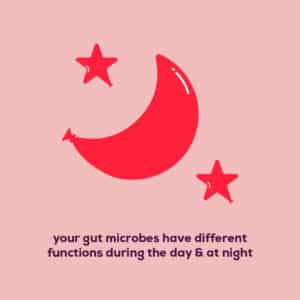the gut and sleep the full lowdown
gut health and sleep go hand in hand. the quality and quantity of sleep we get impacts the way in which your gut microbes work and those microbes impact your sleep – so to put it simply, sleep affects microbes, microbes affect sleep.
Your internal body clock, AKA your circadian rhythm, responds to light and dark and regulates physical and mental processes that occur at different times.
Fascinatingly, you gut microbes work on a similar clock and have different functions during the day and at night. However, a lot of that depends on your own body clock and if you start going to bed at crazy times, it can disrupt your delicate community of microbes. If your circadian rhythm is out of whack from sleep deprivation, shift work or poor quality or erratic sleep, this can change the community of microbes living in your gut. The different functions bacteria have in the day and night also influence your own circadian rhythm (pretty smart eh?!).

Think of your microbes as being on shift work – when you go to sleep this signals for one shift to finish and another to start. Imagine if you never knew what time you were starting and finishing your day? You would be pretty confused, right?! There’s also research to suggest that some species (e.g. Bacteroidetes and Firmicutes), showed cyclical changes in abundance from day to night.
Stages of sleep
The first stage of sleep is non-rapid eye movement (NREM), there are 3 stages to this becoming progressively deeper. Waking up during this stage will make you feel a bit disorientated. This is then followed by rapid eye movement (REM) – where you dream. Each adult cycle lasts 1.5 hours and to feel refreshed, you need to go through all 4 stages, ideally 5-6 cycles per night.
After around 15 hours of being awake, you should start to feel ready to sleep again.
How much sleep do you need?
Between the ages of 18-65 you need 7-9 hours per day. What you need is likely to differ from one person to the next. Quality of sleep is also important; you could have 7-9 hours of total sleep but this could be disrupted sleep meaning you don’t go through all of the sleep cycles needed to help you feel refreshed.

Sleep hygiene
It’s clear that making sure you sleep well is going to have a positive effect on your microbes and vice versa. Below are some simple steps you can take to help you get that circadian rhythm working as it should. REGULARITY is key.
- Stick to a routine: keeping regular sleep and awake times helps your body regulate its circadian rhythm.
- Natural light: it doesn’t have to be a sunny day but where possible, try to expose yourself to natural light at the same time of day every day. This can really help you feel more alert if you are facing a long day behind a screen.
- Exercise: exercising too close to bedtime can disrupt your sleep. Try to exercise in the day rather than before you go to bed.
- Avoid stimulants: Stay away from nicotine and caffeine for the 8 hours before sleep. Caffeine has a half-life of 12 hours so try to keep caffeine intake to pre-midday.
- Eat and drinking: Avoid being too full, hungry or thirsty before sleep.
- No screens before bed: screens interfere with your body’s own hormones that help you sleep. This can increase alertness and stress – not conducive to a proper night’s sleep. Tuck your phone up too – put it in a box or drawer and turn it off.
- Alcohol: while it may relax you and make you feel sleepy, alcohol can really affect the quality of your sleep and how well you go through sleep cycles.
Give our sleep tips a go and let us know how you get on!
References
Li, Y., Hao, Y., Fan, F., & Zhang, B. (2018). The Role of Microbiome in Insomnia, Circadian Disturbance and Depression. Frontiers in psychiatry, 9, 669. https://doi.org/10.3389/fpsyt.2018.00669
Liang, X., Bushman, F. D., & FitzGerald, G. A. (2015). Rhythmicity of the intestinal microbiota is regulated by gender and the host circadian clock. Proceedings of the National Academy of Sciences of the United States of America, 112(33), 10479–10484. https://doi.org/10.1073/pnas.1501305112
Liu, B., Lin, W., Chen, S., Xiang, T., Yang, Y., Yin, Y., Xu, G., Liu, Z., Liu, L., Pan, J., & Xie, L. (2019). Gut Microbiota as an Objective Measurement for Auxiliary Diagnosis of Insomnia Disorder. Frontiers in microbiology, 10, 1770. https://doi.org/10.3389/fmicb.2019.01770
Smith, R. P., Easson, C., Lyle, S. M., Kapoor, R., Donnelly, C. P., Davidson, E. J., Parikh, E., Lopez, J. V., & Tartar, J. L. (2019). Gut microbiome diversity is associated with sleep physiology in humans. PloS one, 14(10), e0222394. https://doi.org/10.1371/journal.pone.0222394